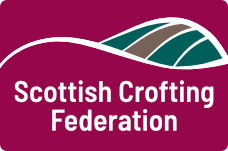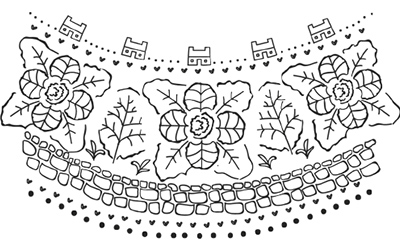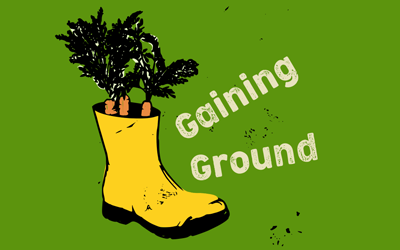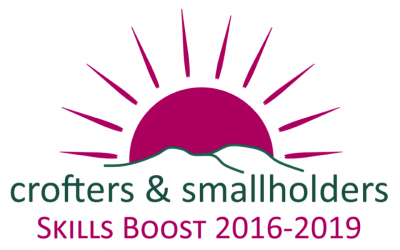Crofting Projects
Grass Ceiling Project 2023 – 2026
Scottish Crofting Federation is working with Newcastle University on an exciting EU-funded programme for empowering...
Crofting Skills for Local Food
This successful project ran from July 21 to March 22 and offered both practical face to face and on-line courses. ...
Crofting Resilience in Transition – Sustain, Diversify, Grow
The Scottish Crofting Federation received funding from Highland and Islands Enterprise to run a 9 month project from...
Crofters’ Diversity Pays!
The Crofters’ Diversity Pays! is a partnership with SCF, Queen Margaret University and SASA (Science and Advice for Scottish Agriculture) and mostly crofter-SME partners to test and develop new ideas that will add diversity and value to traditional crofting crops.
We will be exploring and testing new supply chains for crofting traditional varieties or landraces in different crofting areas, starting with:
Shetland cabbage, Shetland – applying to register as a conservation variety and investigating viability of sale of seeds in different markets
Hebridean rye, Lochaber, testing performance throughout the supply chain – field, milling, nutritional composition, baking, tasting and branding
Events, results and reports will be uploaded as the project progresses and available through the SCF e-newsletter and in The Crofter. For further information please contact su@crofting.org

Gaining Ground – Highland & Moray Social Crofting Network
The Scottish Crofting Federation with funding from Highland and Moray LEADER are running a co-operation project within...
Crofters and Smallholders Skills Boost – 2016/19
This training project aimed at increasing primary agriculture skills for aspiring and new entrant crofters and...
The Croft Woodlands Project
The Croft Woodlands Project offers free advice and support to crofters, common grazings and the wider crofting community to create new, mixed woodland and shelterbelts or improve the management of existing native woodland. Support is also available to smallholders in the Crofting Counties. Funding is available for small scale-tree planting and hedges. The Project can also help with the costs of preparing and submitting an application to the Forestry Grant Scheme.
The Croft Woodlands Project is a partnership between Scottish Crofting Federation, the Woodland Trust Scotland, Point and Sandwick Trust, Forestry Commission Scotland and, Coigach & Assynt Living Landscapes, Shetland Amenity Trust, Orkney Woodland Project, Argyll Small Woods Cooperative and the Highland Small Communities Housing Trust. It will run until mid 2020.
For further details download the Croft Woodland Project leaflet here, or contact your local adviser.
Foundation for Common Land – 2015/16
The project was piloted from January 2015 - May 2016, funded by grant aid from The Prince’s Countryside Fund to roll...
Hedgerow Jelly – a study in Biodiversity and Responsible Foraging
The Woodland Trust Scotland, in partnership with Scottish Natural Heritage and the Scottish Crofting Federation, is offering schools in Highland, Moray and Argyll & Bute the opportunity to apply for a Hedgerow Jelly pack.
The pack contains:
- a pack of young hedgerow plants from six fruiting species for your school grounds;
- an information sheet with planting and care instructions, introducing the hedge as a source of biodiversity and safe, responsible foraging;
- a colourful hedgerow poster, including the recipe for Hedgerow Jelly;
- links to online resources to highlight the range of learning opportunities of the hedge.
This is a long-term project, starting with planting a new hedge, caring for it (with minimum input) and watching it mature over the years, to provide a haven for wildlife and, in a few years, to yield a harvest of fruit for a special jelly.
For further information contact eleanorgarty@woodlandtrust.org.uk
To read a PDF about the project. Please click here …
To see a poster about the project Please click here …
Hungry for Rights
 Hungry for Rights aims to educate and raise awareness of alternative food systems, offering extensive training and tutoring to promote short supply chains in crofting areas of Western Scotland.
Hungry for Rights aims to educate and raise awareness of alternative food systems, offering extensive training and tutoring to promote short supply chains in crofting areas of Western Scotland.
Starting in 2013 the new 3 year EU-funded project, will emphasise that the development of short supply chains is an issue of concern for all citizens. A change from industrial forms of food production to shorter supply chains and more local food will require not only producers to change their production but also consumers and local authorities to change their habits and policies.
Consumers are often a driving force behind the local development of short food supply chains. Local authorities can play a role in the promotion of local food through public procurement.
Therefore, the project brings together representatives of these different groups. The inclusive approach will guarantee a thorough diagnosis of challenges and bottlenecks, help to identify specific needs for skills development and capacity building and enable work on a shared agenda on local food policy.
The lead partner is ACRA (Cooperazione Rurale in Africa e America Latina), a non-governmental, non-profit, organisation, recognised by the Italian Ministry of Foreign Affairs and the European Union. Other project partners include Friends of the Earth Cyprus, Urgenci- the international network for Community Supported Agriculture in France, the Baltic Environmental Forum – Legambiente and People’s Expo in Italy.
Project workshops
Workshops will be organised with three thematic areas: food policy, alternative food systems and the future of crofting. On food policy, the first workshop was a public consultation on Becoming a Good Food Nation, held in Inverness, 24 September 2014. This was co-organised with Nourish Scotland. For 2015 workshops on different ways of organising local produce will be organised, such as box schemes and food hubs. Hungry for Rights will co-organise the Young Crofters gathering in Assynt.
Project outputs
A good introduction to the project is a video (please click here) made during the international exchange visit in France November last year in which participants from each country give their perspective on alternatives to the current food system or about community-based food systems in their country.
A series of Best Practices in community-based food systems from the project partner countries, with case studies from Cyprus, Italy, France, Lithuania, Scotland and Senegal, can be downloaded here.
Project website:
www.hungryforrights.org

Crofting Community Mapping
The SCF believes that a community mapping approach to populating the register of crofts would be far more effective and acceptable than the individual ‘trigger point’ concept proposed by Scottish Government. The community gather together and helped by trained facilitators and mediators they generate the maps of their community assets together by walking through the community, comparing existing maps, drawing boundaries on maps and so on. This is a well-practiced development methodology that has proven benefits:
It gets the community together in an exercise that strengthens the community and builds social capital; the community takes ownership of the mapping and the subsequent agreed maps; disputes will still arise but can be more easily resolved at the time using trained mediators in the exercise; the community creates a collective map and/or a series of individual maps that could be submitted to the register together; the mapping itself can be cheaper as there is less dependence on judicial expertise; maps are created and registered in a matter of months. Depending on how well resourced this is, the whole crofting area could be mapped in a few years rather than generations.
What do we hope to achieve?
This project aims to enable communities to take pre-emptive steps to agree their rights and boundaries before they are required to map them for the Land Register. It will also enable communities to assess their assets, both household and community, that will enable them to better plan future developments within their community.
We are pleased to say that the Scottish Government and Registers of Scotland (RoS) are now co-funding a post to facilitate and encourage group registrations to the Crofting Register.
Please see our Rules of Procedure below:
Crofting Resources Programme
 Fundamental to SCF is our belief in the crofting system and in crofting underpinning the future of the rural policy in the crofting counties. We are working to increase the contribution made by crofting to our communities by providing a range of valuable support services by crofters.
Fundamental to SCF is our belief in the crofting system and in crofting underpinning the future of the rural policy in the crofting counties. We are working to increase the contribution made by crofting to our communities by providing a range of valuable support services by crofters.
The Crofting Resources Programme (CRP), which is funded by the Scottish Rural Development Programme, Esmee Fairbairn Foundation and Highlands and Islands Enterprise, aims to build capacity within the crofting community through collaborative activity. The CRP develops co-operation and assists networks of producers to utilise existing best practice. Crofter-led producer groups have considerable capacity to contribute to the aims of the Scottish Government Food Policy.
The programme assists crofting communities to make best use of the resources available to them in order to sustain the cultural heritage of crofting, its people and practices, and the rich environment and cultural landscape derived from extensive crofting land use.
For more information please see the Crofting Resources Programme (CRP) web page.
SCF would like to thank the the following organisations for supporting this programme.

This project is now completed.











